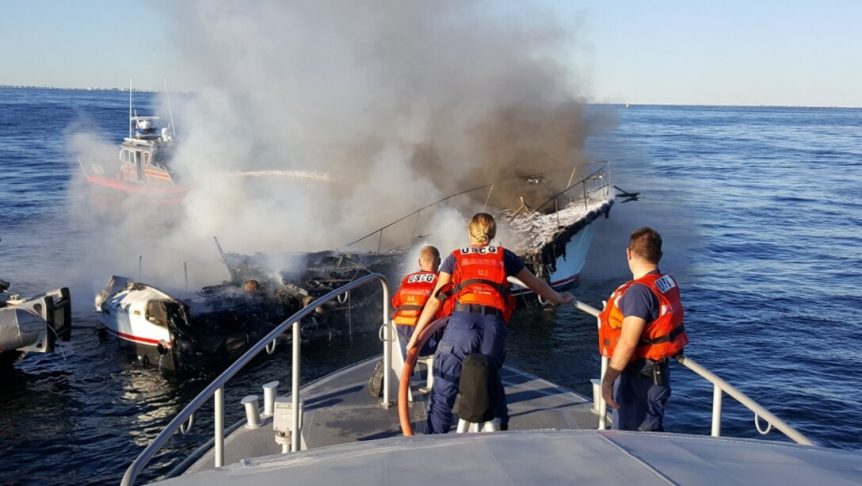Boat fires are dangerous and can threaten the property and lives of the people on it. Like any other fires, the time between the detection and the ignition is critical. The reason is that there are parts of the boat that are highly flammable.
Fiberglass and wood, especially when it is dry and soaked with resins can burn easily. The engine spaces can burn quickly, whether you are using diesel or gasoline. Adding fuel to the fire are fumes that can quickly fill the space in the boat, which makes it inaccessible and deadly.
So, how are we going to deal with a boat that catches fire? The key to dealing with a motor fire is being aware that something is burning on the boat. Once you are aware of the fire, you can take necessary actions during the first few seconds and contain it.
There should be smoke alarms installed on the cabins and its enclosed spaces. This serves as the first line of defense. And more importantly, on the sleeping quarter and galley on the boat. Some boats have sophisticated smoke and fire alarm systems that can alert the pilot when he is at the helm. It will save critical seconds to contain the fire.
The Basics of Fire
Just like any battle, the key to fighting fire on the boat is knowing the basics. You need to know about your enemy to be able to fight it effectively and safely.
Fire is classified according to the type of materials. Here are the fire classifications that you should remember:
- Class A – The fires are fueled by solid materials like paper, wood, cloth, and plastics.
- Class B – In this class, the fires involve flammable gases and liquids. Examples are gasoline, varnishes, diesel, and others.
- Class C – This is the type of fire powered by energized electrical equipment and circuits.
In summary, what you need to remember is: Class A involves solids, Class B are liquids, and Class C is for electricals.
Every boat should be equipped with firefighting devices like fire extinguishers to help put out the fires. Just like the types of fire, they are also classified according to what it can do. To give clarity to this matter, let us take a look at what can work effectively for each fire type.
- Type C Fire Extinguisher – This is used to put out electrical fires.
- Type ABC Fire Extinguisher – This is a multipurpose extinguisher that can be used for all types of fires.
- Water can be effective in putting out Class A fire. However, it can aggravate a burning oil in a frying pan, which is classified as Class B. Using water on Class C fire can cause electrocution or shock.
Looking at our options, it is safe to conclude that the most useful to have on your boat is a multipurpose fire extinguisher. It is also vital that the fire extinguisher is USCG-approved. The fire extinguisher should be placed in strategic locations that are easy to see and reach. The most common places that should have fire extinguishers are the engine compartment, the galley, and living quarters. The most common fire extinguisher among boaters is portable dry extinguishers. These are portable and cheap; yet effective. Make sure to regularly check the fire extinguisher and let everyone know how to use it.
Steps to Take When the Motor Catches Fire
If the boat is still in the marina, evacuate the boat, and call the firefighters to handle it. The fire extinguishers can only handle small fires, so if you cannot put out the fire with one or two fire extinguishers, get out and let the professionals do their job.
For fires that happened in the waters, you have to rely on yourself because evacuation may take some time. How you respond to the fire will depend on the existing conditions like the fire type, location, and many others.
Here are the simple steps to do when the motor on your boat catches fire.
Step 1: Switch off the engines. The problem with the running engine is it will make the fire worse than it already is. The fuel in the engine may catch fire and explode.
Step 2: Shut off the fuel supply. Most boats have a built-in safety mechanism that allows you to turn off the supply of fuel to the engine. It ensures that the fuel is contained and will not spill to the fuel lines, which can cause an explosion.
Step 3. Shut off the gas cylinders. In case your boat has gas cylinders, turn it off to prevent gas leakages. It can be another possible cause of the explosion if the gas reached the gas lines.
Step 4: Turn the boat into the direction of the wind. Maneuver the boat in such a way that the wind is coming from the stern. It will keep the flame in the front and not spread out.
Step 5: Keep away from the smoke. Fire smoke contains many harmful substances that could be fatal or overcome you. It will prevent you from doing anything to put out the fire.
Step 6: Call for help. Use the radio to call for help. In case there are other ships or boats in the area, they might help.
Step 7: Relocate the passengers. If you have passengers on the boat, relocate them to a safe area. Make sure they wear life jackets, in case, you all need to abandon the boat.
Step 8: Use the fire extinguisher. Do not use water on the fire. Use the fire extinguishers on board.
Step 9: Use the PASS method with the fire extinguisher.
- P – Pull the PIN
- A – Aim at the base of the fire
- S – Squeeze the handle of the fire extinguisher
- S – Sweep the fire by swinging the extinguisher in a left to the right sweeping motion
Step 10: Choke the fire. Oxygen is the main ingredient needed for the fire to thrive. If it runs out of oxygen, it will die. Use this principle in extinguishing the fire. Cut off the supply of oxygen to the area where the fire is burning. The fire will eventually burn itself out.
Step 11: Open the doors and enclosure covers carefully. Make sure to open the doors just enough for the nozzle to push through. It will also cut off the oxygen and keep the fire from burning.
Step 12: Call for Help. If you are close to the shore and have network coverage, call for emergency services.
Conclusion
We hope that we have answered your question on what you should do if the motor on your boat catches fire. Boating is a pleasant experience, but it also takes a lot of responsibility. With this simple nugget of information, you can practice safety on the boat and troubleshoot emergencies like fires.

My name Is Larry Noel, the voice behind BoatCrunch.
I’m a boating enthusiast that loves nothing more than being out on the water. So much so that I’ve acquired a Degree in Marine Biology (MB) as well as a degree in Ocean Engineering (OE).
I’m very familiar with a wide range of different boats and I’ve owned a variety of different boats myself however I have a particular obsession with Pontoon boats. I’ve lived all across the United States and always kept company in the form of boats and now my loving family.

